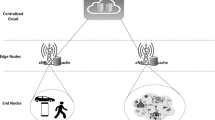Abstract
In this paper we examine the problem of group-based multicast communication in the context of mobile computing with wireless communication technology. We propose a protocol in which group members may be mobile computers and such that the group membership may change dynamically. Multicasts are delivered in the same order at all group members (totally-ordered multicast). Mobile computers are resource-poor devices that communicate with a wired network through a number of spatially limited cells defining wireless links. The spatial coverage provided by wireless links may be either complete or incomplete, which makes the overall system model both general and realistic. The proposed protocol is simple and does not require any hand-off in the wired network upon movements of group members. Moreover, there is no part of the protocol requiring that group members do not move during its execution. This feature leads to mobility assumptions that are practical because they involve only the global movement of group members, e.g., assumptions of the form “a group member does not move very fast all the time”.
Similar content being viewed by others
References
A. Acharya and B. Badrinath, A framework for delivering multicast messages in networks with mobile hosts, Mobile Networks and Applications 1(2) (1996).
H. Attiya and R. Rappoport, The level of handshake required for establishing a connection, in: Distributed Algorithms, Lecture Notes in Computer Science, Vol. 857 (Springer, 1994) pp. 179–193.
Ö. Babaoglu, A. Bartoli and G. Dini, Enriched view synchrony: a programming paradigm for partitionable asynchronous distributed systems, IEEE Transactions on Computers 46(6) (1997) 642–658.
B. Badrinath, A. Acharya and T. Imielinski, Structuring distributed algorithms for mobile hosts, in: Proc. of the 14th IEEE International Conference on Distributed Computing Systems (June 1994) pp. 21–28.
K. Birman, The process group approach to reliable distributed computing, Communications of the ACM 36(12) (1993) 36–53.
K. Birman, A. Schiper and P. Stephenson, Lightweight causal and atomic group multicast, ACM Transactions on Computer Systems 9(3) (1991) 272–314.
K. Birman and R. Van Renesse, Reliable Distributed Computing with the Isis Toolkit (IEEE Computer Society Press, 1994).
K. Brown and S. Singh, M-UDP: UDP for mobile cellular networks, SIGCOMM Computer Communication Review (October 1996).
K. Brown and S. Singh, RelM: Reliable multicast in wireless networks, Manuscript, Department of Computer Science, University of South Carolina (January 1996).
R. Cáceres and L. Iftode, Improving the performance of reliable transport protocols in mobile computing environments, IEEE Journal on Selected Areas in Communications 13(5) (1995) 850–857.
S. Deering and D. Cheriton, Multicast routing in datagram internet-works and extended LANs, ACM Transactions on Computer Systems 8(2) (1990) 85–110.
G.H. Forman and J. Zahorjan, The challenges of mobile computing, IEEE Computer 27(4) (1994) 38–47.
R. Ghai and S. Singh, An architecture and communication protocol for picocellular networks, IEEE Personal Communications (Third Quarter 1994) 36–46.
V. Hadzilacos and S. Toueg, Fault-tolerant broadcasts and related problems, in: Distributed Systems, 2nd edition, ed. S. Mullender (ACM Press, 1993).
D. Johnson and D. Maltz, Protocol for adaptive wireless and mobile networking, IEEE Personal Communications (February 1996) 34–42.
F. Kaashoek and A. Tanenbaum, An evaluation of the Amoeba group communication system, in: Proc. of the 16th IEEE International Conference of Distributed Computing Systems (May 1996) pp. 436–447.
B. Lampson, Reliable messages and connection establishment, in: Distributed Systems, 2nd edition, ed. S. Mullender (ACM Press, 1993).
S. Maffeis, W. Bischofberger and K.U. Mätzel, A generic multicast transport service to support disconnected operation, Wireless Networks 2(1) (1996) 87–96.
Author information
Authors and Affiliations
Rights and permissions
About this article
Cite this article
Bartoli, A. Group-based multicast and dynamic membership in wireless networks with incomplete spatial coverage. Mobile Networks and Applications 3, 175–188 (1998). https://doi.org/10.1023/A:1019120631022
Issue Date:
DOI: https://doi.org/10.1023/A:1019120631022




